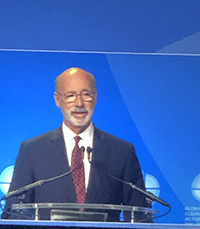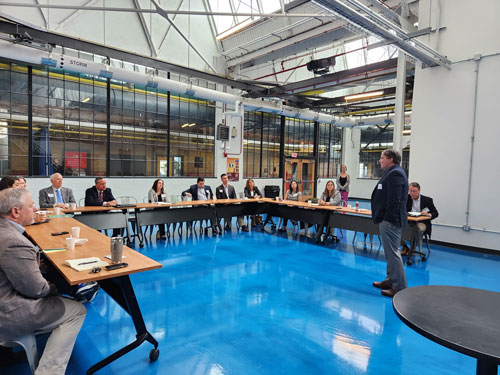Clean Energy: Evolution or Revolution
The eyes of the sustainability world were on Pittsburgh a few weeks ago as the city hosted the first annual Global Clean Energy Action Forum. The US Department of Energy planned this event, drawing from energy ministers and attendees from over 30 countries, calling Pittsburgh the ideal city for this inaugural event. As a city globally known for its intense extractive and industrial past, Pittsburgh’s path forward as an energy innovator churning out green jobs stands as a global model “for all of the other Pittsburghs around the world,” stated DOE Secretary Jennifer Granholm. As County Executive Rich Fitzgerald later told me, “Our focused efforts and being the largest 2030 District in the world really sealed the deal” for Secretary Granholm’s decision to choose Pittsburgh.
Over 6,000 people attended the conference held at the DLCC, once the world’s largest LEED certified buildings. Ukraine’s energy minister, who received a solid minute of solidarity applause, demonstrated the clear potential for the weaponization of energy, particularly oil and gas. Secretary Granholm announced that $7B will be awarded for 10 hydrogen hubs around the country. Bill Gates spoke of the need to get to a zero cost premium on clean energy as soon as possible, which can only be established through scale.
🗞️BIG NEWS: More than a dozen countries committed a total of $94 BILLION for clean energy technology demonstrations at #GCEAF, surpassing @POTUS' goal of $90 billion. Get the details: https://t.co/ra0ceq0eJ1 pic.twitter.com/bd7mLIcLPz
— Global Clean Energy Action Forum (@GCEAF_USA) September 26, 2022
The conference was well received, with notable criticisms being the advocacy of gas-friendly Blue Hydrogen (which requires extensive gas combustion) and of Carbon Capture and Storage (which greatly reduces power plant efficiency). If there was a theme for the conference, it was “Deploy, deploy, deploy” in the words of the Secretary, implying that we currently have the building blocks to create this new economy and that widespread corporate adoption is necessary to take it to scale.

Governor Tom Wolf at the Global Clean Energy Action Forum
Dozens of speakers spoke at plenary sessions, with breakout sessions and shoulder events. I thanked Governor Wolf for his leadership in carbon reduction, having my own slight understanding of such advocacy in the hydrocarbon superpower that is Pennsylvania. “I’m not sure how Josh Shapiro will do,” I said, “ but we will miss your commitment. The State’s carbon reduction goals you established in 2019 gave those of us working on the Climate Action Plan something to work with.”
“Of course,” he replied, “how can you know what to work for without clear goals?”

Marc Mondor AIA speaks at 2022 KEEA Forum
A few days later, I had the opportunity to speak at the Keystone Energy Efficiency Alliance’s Candidate Education Forum, advocating for an increase to our Renewable Energy Portfolio Standard, the need to update our outdated Act 129 and the need for the Regional Greenhouse Gas Initiative (RGGI) to be implemented, as we absolutely need to place a price on carbon. Carbon has a social cost and this must be reflected in the marketplace. Carbon and energy reduction ties in to sustainability as a quality of life issue, with cleaner air, blunting climate change, healthy families, transportation options, more durable buildings and economic security.
Regarding national affairs,the scope of the Inflation Reduction Act is sweeping and comprehensive, looking at renewables, energy efficiency, plugging leaking abandoned wells (Pennsylvania has over 200,000 alone), environmental justice, coalfield justice, education, transportation and power generation. “This is what we’ve been waiting for,” as Deputy DOE Secretary Sally Benson stated. There is a sweet spot between too many and too few incentives, and the IRA appears cognizant of this balance. The perspective is longer term, with the spend to last over a decade, allowing those of us in the industry to benefit from predictable market signals as we strategize how to best deploy these forthcoming strategies.
—
Marc Mondor, AIA, LEED Fellow, is Principal of evolveEA, was reelected as Vice Chair of the PA Climate Change Advisory Committee, and is Appointee to the AIA’s national Climate Action and Design Excellence Committee

